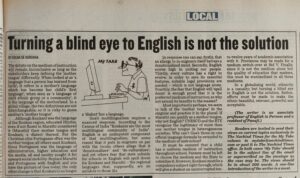Turning a blind eye to English is not the solution

The debate on the medium of instruction will remain inconclusive as long as the stakeholders keep defining the 'mother tongue' differently. When looked at as 'a language that a person has learned from birth', it refers to a mother's language which has become her child's 'first language'; when seen as 'a language of one's ethnic group or a community', it is the language of the motherland. In the global village, the two definitions are not interchangeable; so it is risky to guess another's 'mother tongue'.
Although Konkani was the language of the Konkan region, educated Hindus, even if not fluent in Marathi considered Marathi their mother tongue and Konkani, a dialect thereof. For the Christian elite Portuguese often was the mother tongue; all others used Konkani. Since Portuguese was the language of administration, higher education and the media, all and sundry sought it for upward social mobility. Replace Marathi and Portuguese with English and you have the picture of Goa today; the only other change is that Konkani is no longer a 'dialect' but a language.
Goa's multilingualism requires a nuanced response. According to the Census of India "Konkanis are the most multilingual community of India". English is an undisputed component of that multilingualism, but some resent that it puts in-migrants on par with the locals; others allege that it 'denationalises' and 'de-culturalises'; and yet others fear that state subsidy for schools in English will spell doom for Konkani and Marathi - the regional languages that, supposedly, are an antidote to those ills.
In response one can say, firstly, that an allergy to in-migrants itself betrays a denationalised mind. Secondly, English scores high in uniting our people. Thirdly, every culture has a right to evolve; in order to save its essential features, suitable legal provisions are needed -- which is not language alone. Fourthly, the fear that English will 'spell doom' is enough proof that it is the preferred medium of instruction; so why not extend its benefits to the masses?
Most importantly perhaps, we seem to talk of the 'mother tongue' in the singular and practice it in the plural! If Marathi can qualify as a mother tongue, why not English? UNESCO and the RTE recognise the legitimacy of more than one mother tongue in heterogeneous societies. Why can't Goa's three-in-one official language formula be extended to the medium of instruction?
It must be ensured that a child has a uniform medium of instruction throughout school. Parents must be left to choose the medium and the State to subsidise it. However, Konkani must be a compulsory subject right through, which will give a student an uninterrupted ten-to-twelve years of academic association with it. Provisions may be made for a medium switch-over at Std V. Finally, since it is not the medium alone but the quality of education that matters, this must be standardised in all three mediums.
In a globalizing world, ethnicity is a casualty; but turning a blind eye to English is not the solution. Rather, efforts must be made to make the ethnic beautiful, relevant, powerful and acceptable.
('My Take' column, The Navhind Times, 9 April 2011, p. 5)
